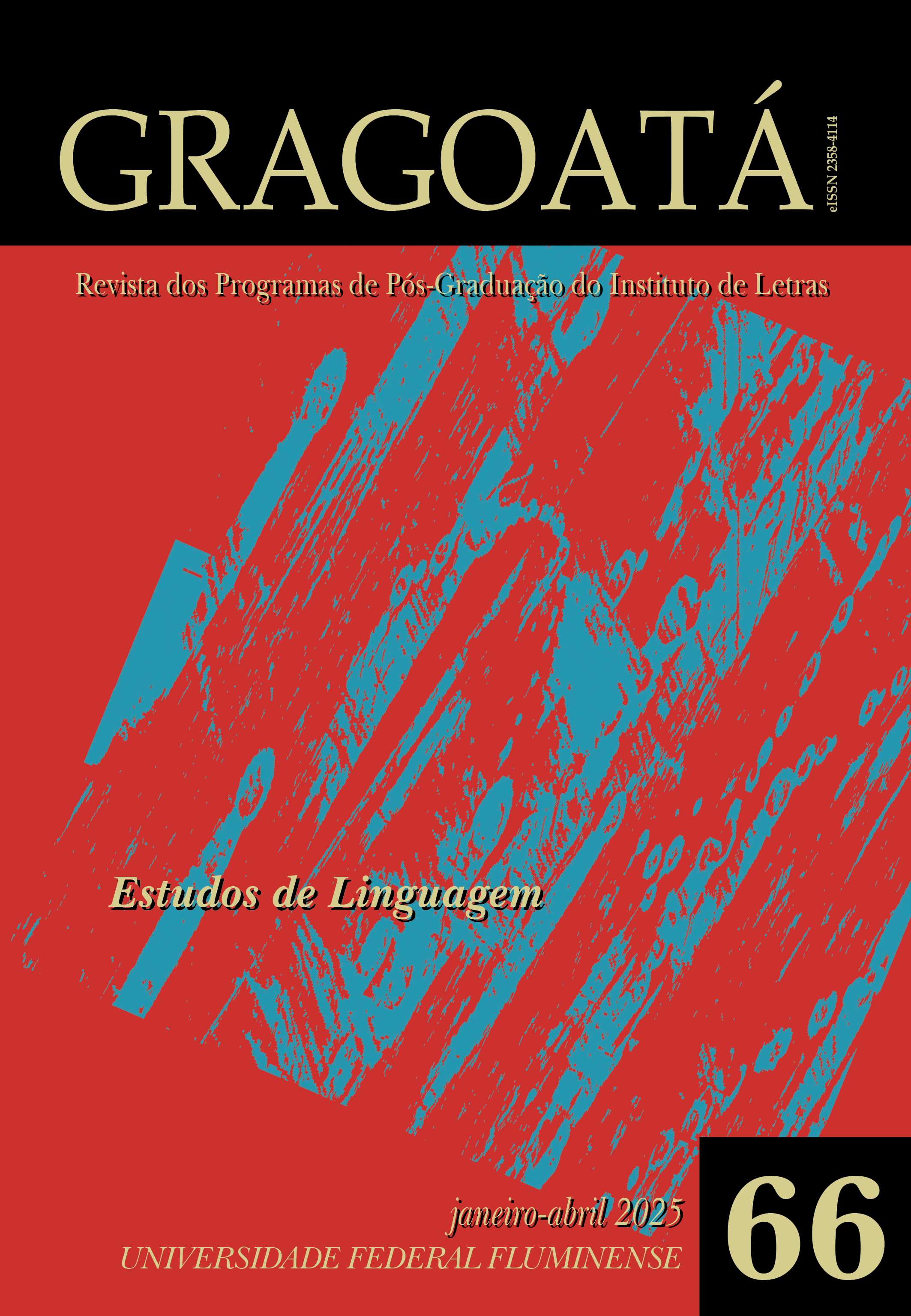The Portuguese Coloniality in Mozambique: Clashes in the Development of Bantu Languages
DOI:
https://doi.org/10.22409/gragoata.v30i66.64363.ptKeywords:
Coloniality, Eurocentrism, Bantu Languages, PortugueseAbstract
The Constitution of the Republic of Mozambique defends the valorization of Mozambican languages of Bantu origin, a linguistic planning scenario that, a priori, is favorable to their development and teaching. However, the gap between these local languages and the Portuguese language appears to be greater, as the latter is seen as a language of teaching, of national unity and of administrative character, which gives it a strong status compared to the others. In this context, this paper aims to discuss aspects of the linguistic policy established in the country, the results of which show that, given the hegemony of Portuguese, the percentage of speakers of this language increases from year to year, with the implementation of linguistic control institutions, the which will eternalize the coloniality of power, knowledge and language, embodied in epistemicide and linguicide and, consequently, in the elimination of the people’s culture. Therefore, teaching, promoting and maintaining the native languages of people is a matter of human right, as natural languages are a collectively constituted reality and it is in the community that they are available for individual use as an instrument of unity, identification, communication and expression creator. The rights of all linguistic communities as equals must be defended, regardless of their legal status (UNESCO, 1996).
Downloads
References
BAVO, Názia; NGUNGA, Armindo. Práticas linguísticas em Moçambique: avaliação da vitalidade linguística em seis distritos. Maputo: Editora da UEM, 2011.
BOFF, Frei Leonardo. A águia e a galinha: uma metáfora da condição humana. Petrópolis: Vozes, 1997.
BORSTEL, Clarice Nadir Von. Aspectos do bilinguismo: Alemão/português em Marechal Cândido Rondon – Paraná-SC. 1992. 195f. Dissertação (Mestrado em Letras-Linguística) – Programa de Pós-Graduação em Letras e Linguística, Universidade Federal de Santa Catarina, Florianópolis, 1992.
BOSI, Alfredo. Dialética da colonização. São Paulo: Schwarcz, 1996.
CANETTI, Elias. Massa e poder. Tradução de SergioTellaroli. São Paulo: Companhia de Bolso Editora, 2019.
CARNEIRO, Aparecida Sueli. A construção do outro como não-ser como fundamento do ser-SP. 2005. 339f. Tese (Doutorado em Educação) –Programa de Pós-Graduação de Educação, Universidade de São Paulo, São Paulo, 2005.
CONSTITUIÇÃO DA REPÚBLICA DE MOÇAMBIQUE. Imprensa Nacional, 2004. Disponível em: https://www.portaldogoverno.gov.mz/por/Media/Files/Constituicao-da-Republica-PDF. Acessoem: 21 jan. 2023.
DAMKE, Ciro. Sprachgebrauch und Sprachkontakt in der deutschenSprachinsel in Sudbrasilien. Frankfurt am Main; Berlin; Bern; New York; Paris; Wien: Lang, 1997.
GÓMEZ, Miguel Buendia. Educação moçambicana – História de um processo: 1962-1984. Maputo: Livraria Universitária, 1999.
KLOSS, Henz. Research possibilities on group bilingualism: A report. International Centre for Research on Bilingualism. Quebec: ERIC, 1969.
LATOUCHE, Serge. A África pode contribuir para resolver a crise do Ocidente?Revista Espaço Plural, Paraná, vol.XIV, n. 28, p. 175-195, jan./jun. 2013. Disponível em:http://www.redalyc.org/articulo.oa?id=445944241009. Acesso em:23 nov. 2022.
MIGNOLO, Walter. Histórias locais, projetos globais. Colonialidade, saberes subalternos e pensamento liminar. Belo Horizonte: Editora da UFMG, 2003.
NASCIMENTO, Elisa Larkin. Sankofa: Significados e intenções. In: NASCIMENTO, Elisa Larkin. (org.). A matriz africana no mundo. São Paulo: Selo Negro, 2008.p. 29-54.
NÚCLEO DE ESTUDO DAS LÍNGUAS MOÇAMBICANAS (NELIMO). I Seminário sobre a Padronização da Ortografia das Línguas Moçambicanas. Maputo: INDE-UEM/NELIMO, 1989.
NGUNGA, Armindo; FAQUIR, Osvaldo. Padronização da ortografia de línguas moçambicanas: Relatório do III Seminário. Maputo: Editora da CEA/UEM, 2011.
NGUNGA, Armindo. Introdução à linguística bantu. Maputo: Imprensa Universitária, 2004.
NGUNGA, Armindo. Elementos de gramática da língua yao. Maputo: Imprensa Universitária, 2002.
NGUNGA, Armindo. As línguas bantu de Moçambique. Limani, Maputo, v.2, p. 59-70, 1987.
OLIVEIRA, Gilvan Müller.Línguas de fronteira, fronteiras de línguas: do multilinguismo ao plurilinguismo nas fronteiras do Brasil.Revista GeoPantanal, Corumbá, v.11, n.21, p. 59-72, jul./dez.2016.
PRATT, Mary Louise. Artofthe Contacto Zone. Modern Language Association, p. 33-40, 1991.
QUIJANO, Anibal. Colonialidade do saber, eurocentrismo e América Latina.CLACSO, Buenos Aires, 2005.Disponível em: http://bibliotecavirtual.clacso.org.ar/clacso/sur-sur/20100624103322/12_Quijano.pdf. Acesso em 22 de jan. 2023.
RAVETTI, Graciela. Narrativas performáticas. In: RAVETTI, Graciela; ARBEX, Márcia (org.). Performance, exílio, fronteiras: errâncias territoriais e textuais. Belo Horizonte: Editora da UFMG, 2002. p. 47-68.
SITOE, Bento; NGUNGA, Armindo. Relatório do II Seminário sobre a Padronização da Ortografia de Línguas Moçambicanas. Maputo: NELIMO, 2000.
SOARES, Luis Eustáquio. Literatura, Lacan e o Comunismo. Vitória: JEP, 2016.
TAYLOR, Diana. Encenando a memória social: Yuyachkani. In: RAVETTI, Graciela; ARBEX, Márcia (org.). Performance, exílio, fronteiras: errâncias territoriais e textuais. Belo Horizonte: Editora da UFMG, 2002. p. 11-45.
UNESCO. Declaração Universal dos Direitos Linguísticos. Barcelona, 1996. Disponível em: http://www.dhnet.org.br. Acessoem: 16 jul.2022.
WEINREICH, Uriel. Language in Contact. New York: Linguistic Circle & The Hague, 1953.
Downloads
Published
How to Cite
Issue
Section
License
Copyright (c) 2025 Gragoatá

This work is licensed under a Creative Commons Attribution 4.0 International License.
Authors who publish in Gragoatá agree to the following terms:
The authors retain the rights and give the journal the right to the first publication, simultaneously subject to a Creative Commons license CC-BY-NC 4.0, which allows sharing by third parties with due mention to the author and the first publication by Gragoatá.
Authors may enter into additional and separate contractual arrangements for the non-exclusive distribution of the published version of the work (for example, posting it in an institutional repository or publishing it in a book), with recognition of its initial publication in Gragoatá.

Gragoatá is licensed under a Creative Commons - Attribution-NonCommercial 4.0 International.














